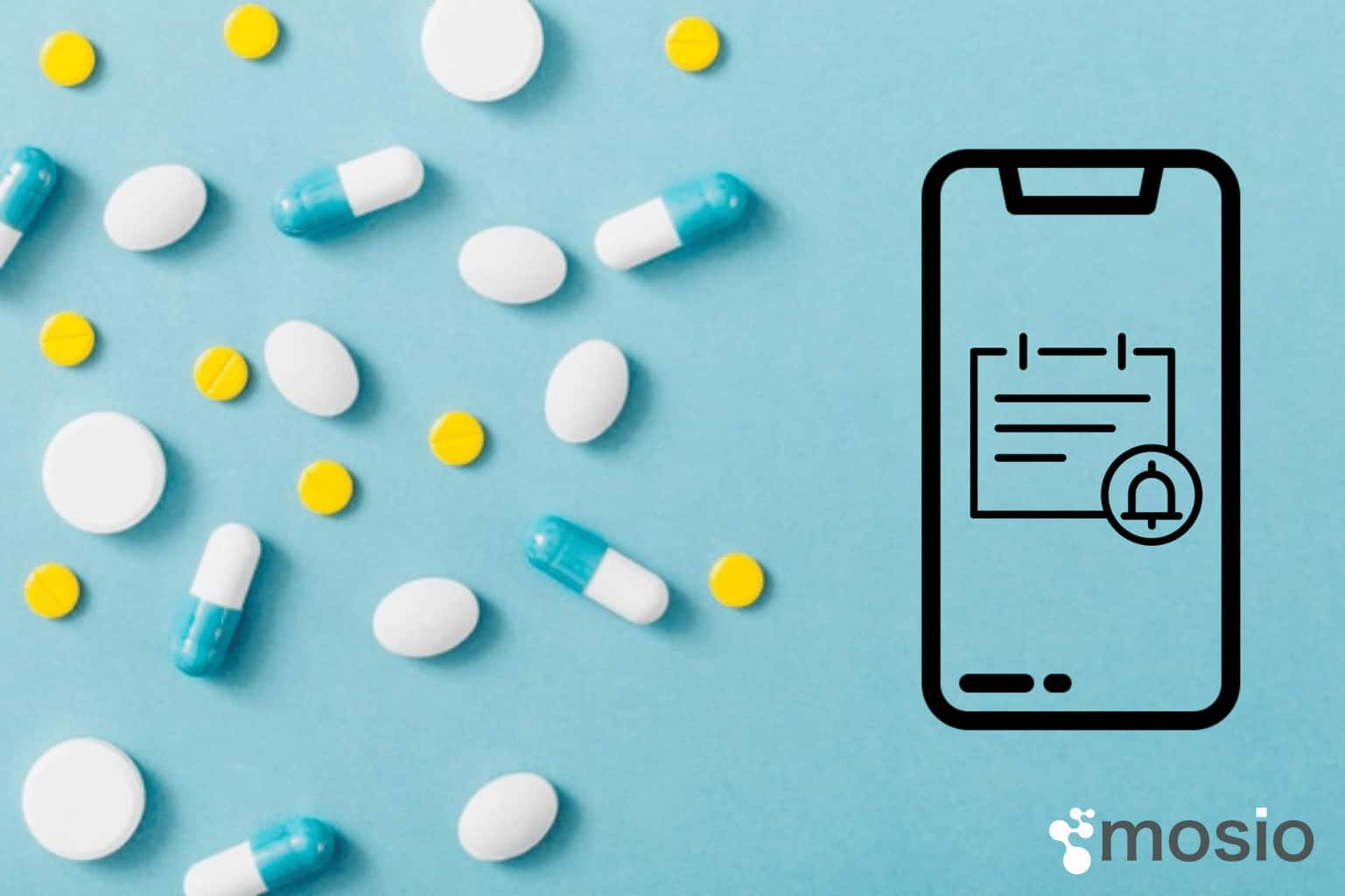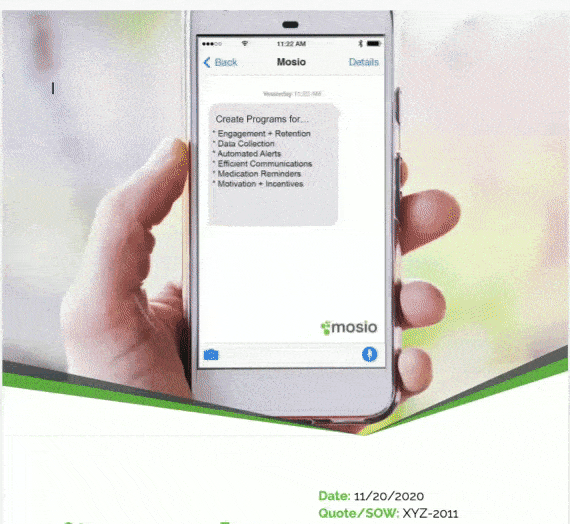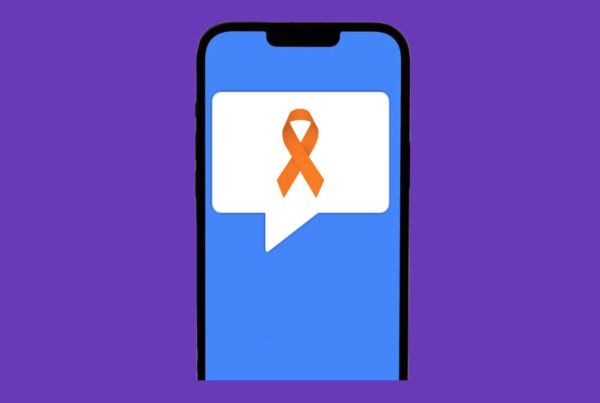21 Studies Showing the Effectiveness of Text Messaging to Improve Medication Adherence
Text messaging solutions have been used in the research community to achieve increased engagement and participation by subjects of medical studies and to improve communications between patients and their healthcare providers. Convenient and practical, text messages are an ideal way to increase medication compliance for a wide range of healthcare needs. By implementing these systems into the overall framework of patient and study participant communications, it is possible to elicit prompt and accurate responses that can increase compliance and the accuracy of the data collected.
Mosio offers easy-to-use ways to implement text message alerts, reminders, surveys and other communications to assist patients and study participants with managing their treatment regimens and required participation more effectively. Our suite of mobile technology solutions will offer added help for researchers, medical professionals and healthcare agencies in managing their communications with study participants and patients.
Here are 21 studies that demonstrate the positive benefits of text messaging for studying and managing medication compliance in the medical and research fields. Whether you’re looking at Mosio or some other solution, we have compiled these studies for you to help see how text messaging is a useful tool in medication adherence. Frankly, it’s a great tool to ensure compliance in all activities, whether it is taking medicine or completing some other desired action for your studies.
Improving medication adherence with adjuvant aromatase inhibitor in women with breast cancer: A randomised controlled trial to evaluate the effect of short message service (SMS) reminder
2020
Medication adherence is crucial for improving clinical outcomes in the treatment of patients. We evaluate the effect of short message service (SMS) reminder on medication adherence and serum hormones in patients with breast cancer on aromatase inhibitors.
link
Lay health supporters aided by mobile text messaging to improve adherence, symptoms, and functioning among people with schizophrenia in a resource-poor community in rural China (LEAN): A randomized controlled trial
2019
Schizophrenia is a leading cause of disability, and a shift from facility- to community-based care has been proposed to meet the resource challenges of mental healthcare in low- and middle-income countries. We hypothesized that the addition of mobile texting would improve schizophrenia care in a resource-poor community setting compared with a community-based free-medicine program alone.
link
Effectiveness of short message service intervention to improve glycated hemoglobin control and medication adherence in type-2 diabetes: A meta-analysis of prospective studies
2019
Distance education or reminder by texting short message may improve HbA1c level and medication adherence to type-2 diabetes.
link
Mobile Phone Text Messages and Effect on Treatment Adherence in Patients Taking Methotrexate for Rheumatoid Arthritis: A Randomized Pilot Study
2019
To assess the impact of weekly text messages on adherence in patients taking methotrexate (MTX) for rheumatoid arthritis (RA).
link
Text messaging to improve patient adherence in haart: randomized controlled trial
2019
To assess the efficacy of a text messaging (SMS) strategy to improve appointment attendance, treatment adherence, and biological markers (viral load and CD4) in continuous patients with high activity antiretroviral therapy (HAART) who were late to their last scheduled appointment.
link
TEXT messages to improve MEDication adherence and Secondary prevention (TEXTMEDS) after acute coronary syndrome: a randomised clinical trial protocol
2017
Identifying simple, low-cost and scalable means of supporting lifestyle change and medication adherence for patients following a cardiovascular (CV) event is important.
link
Text Messaging to Improve Hypertension Medication Adherence in African Americans From Primary Care and Emergency Department Settings: Results From Two Randomized Feasibility Studies
2017
Our goal was to determine the feasibility, acceptability, and preliminary clinical effectiveness of BPMED, an intervention designed to improve medication adherence among African Americans with uncontrolled HTN, through fully automated text messaging support.
link
Improving Medication Adherence with Two-way Short Message Service Reminders in Sickle Cell Disease and Asthma
2017
Sickle cell disease (SCD) is a childhood and adult disease that primarily affects African Americans, characterized by life threatening sequelae mitigated by medications. One-way and two-way short message service (SMS) medication reminders have differing efficacy in chronic diseases. There is limited literature about SMS medication reminders in SCD.
link
Mobile Telephone Text Messaging for Medication Adherence in Chronic Disease
2016
Adherence to long-term therapies in chronic disease is poor. Traditional interventions to improve adherence are complex and not widely effective. Mobile telephone text messaging may be a scalable means to support medication adherence.
link
Confirming the theoretical structure of expert-developed text messages to improve adherence to anti-hypertensive medications
2016
Text messages can improve medication adherence and outcomes in several conditions. For this study, experts developed text messages addressing determinants of medication adherence: disease beliefs, medication necessity, medication concerns, and forgetfulness, as well as positive reinforcement messages for patients who were adherent.
link
The Effectiveness of Mobile Phone Text Messaging in Improving Medication Adherence for Patients with Chronic Diseases: A Systematic Review
2016
Medication non-adherence is a commonly observed problem in the self-administration of treatment, regardless of the disease type. Text messaging reminders, as electronic reminders, provide an opportunity to improve medication adherence. In this study, we aimed to provide evidence addressing the question of whether text message reminders were effective in improving patients’ adherence to medication.
link
A randomized controlled trial of personalized text message reminders to promote medication adherence among HIV-positive adolescents and young adults
2016
HIV-positive adolescents and young adults often experience suboptimal medication adherence, yet few interventions to improve adherence in this group have shown evidence of efficacy. We conducted a randomized trial of a two-way, personalized daily text messaging intervention to improve adherence to antiretroviral therapy (ART) among N=105 poorly adherent HIV-positive adolescents and young adults, ages 16–29. Adherence to ART was assessed via self-reported visual analogue scale (VAS; 0–100%) at 3 and 6-months for mean adherence level and proportion ≥ 90% adherent. The average effect estimate over the 6-month intervention period was significant for ≥ 90% adherence (OR=2.12, 95% CI=1.01–4.45, p<.05) and maintained at 12-months (6 months post-intervention). Satisfaction scores for the intervention were very high. These results suggest both feasibility and initial efficacy of this approach. Given study limitations, additional testing of this intervention as part of a larger clinical trial with objective and/or clinical outcome measures of adherence is warranted.
link
mHealth SMS text messaging interventions and to promote medication adherence: an integrative review
2015
The World Health Organization has identified medication adherence as a priority global problem. Text messages are emerging as an effective means of improving health behaviours and in some diseases to promote medication adherence. However, a gap in the literature indicates lack of evidence in guiding theories and content of text messages, which should be synthesised prior to use in clinical practice.
link
One-way Versus Two-way Text Messaging on Improving Medication Adherence: Meta-analysis of Randomized Trials
2015
Mobile telephone text messaging is a simple potential solution to the failure to take medications as directed. There is uncertainty over the effectiveness of 1-way text messaging (sending text message reminders only) compared with 2-way text messaging (sending reminders and receiving replies confirming whether medication has been taken) as a means of improving medication adherence.
link
The feasibility of text reminders to improve medication adherence in adolescents with asthma
2015
Personal health applications have the potential to help patients with chronic disease by improving medication adherence, self-efficacy, and quality of life. The goal of this study was to assess the impact of MediHealth (MMH) – a website and a short messaging service (SMS)-based reminder system – on medication adherence and perceived self-efficacy in adolescents with asthma.
link
Text Message Intervention Designs to Promote Adherence to Antiretroviral Therapy (ART): A Meta-Analysis of Randomized Controlled Trials
2014
The efficacy of antiretroviral therapy depends on patient adherence to a daily medication regimen, yet many patients fail to adhere at high enough rates to maintain health and reduce the risk of transmitting HIV. Given the explosive global growth of cellular-mobile phone use, text-messaging interventions to promote adherence are especially appropriate. This meta-analysis synthesized available text messaging interventions to promote antiretroviral therapy adherence in people living with HIV.
link
A text messaging intervention to promote medication adherence for patients with coronary heart disease: A randomized controlled trial
2013
Pharmacologic treatment for secondary prevention of coronary heart disease (CHD) is critical to prevent adverse clinical outcomes. In a randomized controlled trial, we compared antiplatelet and statin adherence among patients with CHD who received: (1) text messages (TM) for medication reminders and education, (2) educational TM only, or (3) No TM.
link
Mobile phone text messaging for promoting adherence to antiretroviral therapy in patients with HIV infection
2012
More than 34 million people are presently living with HIV infection. Antiretroviral therapy (ART) can help these people to live longer, healthier lives, but adherence to ART can be difficult. Mobile phone text-messaging has the potential to help promote adherence in these patients.
link
SMS reminders improve adherence to oral medication in type 2 diabetes patients who are real time electronically monitored
2012
Poor adherence to oral antidiabetics has a negative influence on glycaemic control in type 2 diabetes patients. Real Time Medication Monitoring (RTMM) combines real time monitoring of patients’ medication use with SMS reminders sent only if patients forget their medication, aiming to improve adherence. This study aimed to investigate the effect of these SMS reminders on adherence to oral antidiabetics in patients using RTMM and investigate patients’ experiences with RTMM.
link
Considerations in using text messages to improve adherence to highly active antiretroviral therapy: a qualitative study among clients in Yaoundé, Cameroon
2012
Poor adherence to highly active antiretroviral therapy (HAART) is a major hindrance to the reduction of mortality and morbidity due to HIV. This qualitative study used focus groups to explore the views and experiences of HIV patients on HAART with adherence reminders, especially the text message (SMS [short message service]). The ethnographic data obtained were used to design a clinical trial to assess the effect of motivational text messages versus usual care to enhance adherence to HAART among HIV patients in Yaoundé, Cameroon. Participants appreciated the idea of a timely SMS reminder, and cited the physician as a role model. They expressed concerns about privacy. Long-term life goals were a motivating factor to adhere. Overall, text messaging was viewed positively as a tool with a dual function of reminder and motivator. Messages coming from the attending physician may have a stronger impact. Trials investigating the use of text messages to improve adherence to HAART need to consider the content and timing of SMS, taking into account technical challenges and privacy.
link
Impact of a Text Messaging Pilot Program on Patient Medication Adherence
2012
Medication nonadherence is a well-recognized challenge associated with poor health outcomes and increased utilization of health care resources. Although many different behavioral and educational strategies are available to improve patient medication adherence, technological advances, including cell phone text messaging, represent new and innovative modalities to improve adherence and overall health outcomes.
link
The text messaging solutions offered by Mosio are designed to provide your research team with the tools they need to improve response times and to stay in close communication with your participants. By integrating Mosio’s suite of communication tools into your research and healthcare activities, you can significantly improve the degree of medication compliance among participants in your outreach programs and can ensure that patients report their degree of adherence to their medication regimens for improved care at every stage of their treatment.
Mosio reduces the amount of manual data entry for your team while delivering the right message to the right patient at the right time. To learn more about how the Mosio system works for your patients and your organization, text us today at 425-559-9993 to request more information or get a quote for your project. We look forward to the opportunity to work with you to promote the most effective communications with patients and study participants now and in the future.






